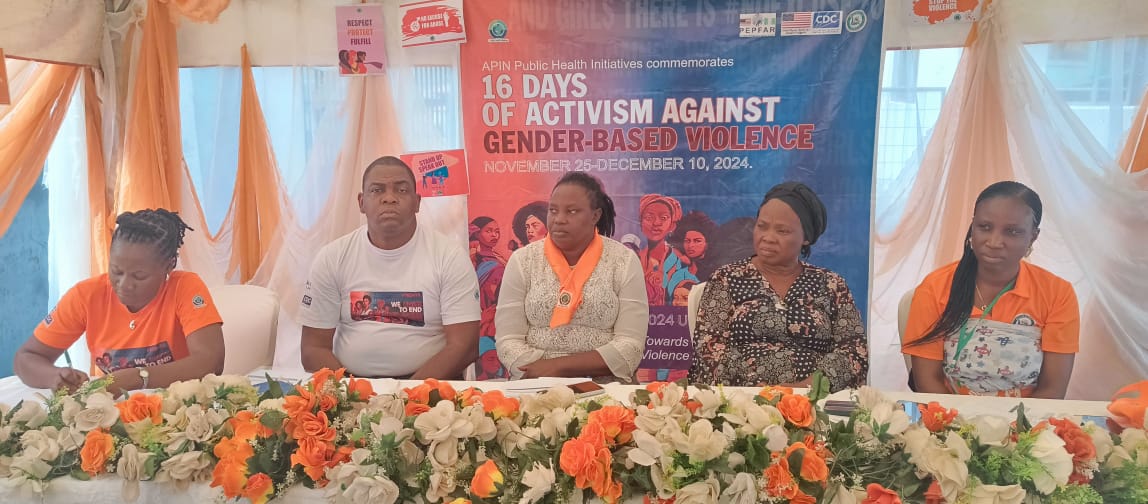The APIN Gender-Based Violence (GBV) campaign for Ogun State has concluded its annual 16-day activism, leaving behind a trail of impactful stories and a call for sustained efforts against gender-based violence.
Favour Ojo-Omoniyi, APIN’s Gender-Based Vocal Person for Ogun State, led the charge, emphasizing the need for community-driven, year-round advocacy to combat GBV.
Speaking at the campaign’s closing session in Abeokuta, Ojo-Omoniyi highlighted the campaign’s progress. “We started this 16-day campaign on November 26 and concluded it today, December 10.
This year, we reached eight schools compared to just one last year. It shows we are expanding our scope, creating awareness among the younger generation about what GBV is and how to avoid becoming perpetrators,” she said.
Ojo-Omoniyi stressed the importance of consistent community participation.
“It shouldn’t be just 16 days; it should be 365 days. When you see something, say something. Call the toll-free lines: 08000000666 or 08000000555.
“This collective vigilance will make Ogun State a safer place.”
During the campaign, several disturbing accounts of GBV emerged. A focal person, recounted the ordeal of a 76-year-old woman who endured prolonged abuse from her husband.
“At her age, she should be enjoying the fruits of her labor. Instead, she came to us unable to walk due to the weight of her suffering.
“Her children ignored her, but just listening to her and offering first-line support restored her hope,” the focal person said.
He also lamented economic challenges fueling GBV.
“The country’s economic pressure contributes significantly. Some of our positive clients are abused because of their HIV status.
“Husbands blame their wives, saying they ‘brought GBV’ into their lives. Counseling alone is not enough; survivors need tangible support.”
The Accidental Gender Based Violence focal Person at Ota General hospital, Aliu Adedokun,shared troubling cases of systemic failures.
He recounted a situation where police dismissed video evidence of abuse due to the perpetrator’s political connections.
“The police said there was no evidence, despite audio and video clips.
This kind of impunity discourages us. Perpetrators walk freely, and whistleblowers face threats. Without strong government and security agency support, justice remains elusive,” he said.
Another expert revealed a case involving a stepbrother and a neighbour raping a girl.
The mother concealed the crime to protect her son. The matter only came to light when a teacher noticed the girl’s deteriorating health.
“Communities often shield criminals, especially influential ones. One notorious rapist repeatedly threatened his victims, and the community protected him. Such complicity hinders justice and emboldens perpetrators,” the expert added.
Another advocate said religious and cultural norms also perpetuate GBV, with pastors advising abused women to stay in violent marriages.
“Even ministers of God use scripture to silence their wives. These religious spaces must be reached to challenge harmful teachings,” the expert noted.
Ojo-Omoniyi called for greater involvement of local councils, religious leaders, and community development associations (CDAs) in the fight against GBV.
“We must extend our reach to areas like Ota and Ayetoro next year. Everyone must become a vocal advocate against violence,” she urged.
As the campaign ends, advocates emphasize that GBV is not just a legal issue but a societal one requiring collective action.
Until communities, authorities, and policymakers work together to address these challenges, victims will continue to suffer in silence.
Do you want to share a story with us? Do you want to advertise with us? Do you need publicity for a product, service, or event? Contact us on WhatsApp +2348183319097 Email: platformtimes@gmail.com
We are committed to impactful investigative journalism for human interest and social justice. Your donation will help us tell more stories. Kindly donate any amount HERE




